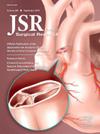Communication After Emergent Surgery by English Proficiency: An Exploratory Qualitative Study
IF 1.8
3区 医学
Q2 SURGERY
引用次数: 0
Abstract
Introduction
Older adults with Limited English Proficiency (LEP) comprise a disproportionate number of trauma and emergency general surgery (EGS) patients. In other settings, this group experiences barriers to communication that are likely exacerbated by acute surgical admission. Despite their likely vulnerability, this topic remains understudied. We conducted an exploratory qualitative study to understand communication of older adults with English Proficiency (EP) and LEP hospitalized for trauma or EGS.
Materials and methods
Trauma/EGS service inpatients aged ≥65 with mild or no cognitive impairment were purposively sampled at a safety-net, level one trauma center. Semi-structured interviews were held with patients and family when present, using interpreters for LEP. Interviews transcripts were 20% triple-coded and thematically analyzed using modified grounded theory within an interpretivist paradigm. LEP transcripts were also examined for interpretation errors.
Results
Twenty-three patients enrolled, 8 with LEP (Spanish, Cantonese, Russian). Three themes emerged: 1. Lack of Information – both groups expressed limited knowledge of their care 2. Loss of Autonomy – both groups endorsed reliance on providers. 3. Feedback and Advocacy – Participants with EP and family members of LEP critiqued care and endorsed the importance of self-advocacy; participants with LEP were reluctant to offer critical feedback. All interviews with professional interpreters contained errors.
Conclusions
Differences in EP and LEP participants’ self-advocacy and critiques suggest that language proficiency and communication style contribute to communication barriers after trauma and EGS. Difficulties are likely compounded by professional interpreter errors. Our study generates foundational evidence for further exploration of these factors and their effects on patient outcomes.
急诊手术后英语水平的沟通:一项探索性质的研究
英语水平有限的老年人(LEP)构成了不成比例的创伤和急诊普通外科(EGS)患者。在其他情况下,这一群体的沟通障碍可能会因急性手术入院而加剧。尽管它们可能很脆弱,但这个话题仍未得到充分研究。我们进行了一项探索性质的研究,以了解因创伤或EGS住院的英语熟练(EP)和英语熟练(LEP)老年人的沟通情况。材料和方法有目的地选取≥65岁、轻度或无认知功能障碍的创伤/EGS服务住院患者。当患者和家属在场时,使用口译员对LEP进行半结构化访谈。访谈记录20%被三重编码,并在解释主义范式下使用修正的扎根理论进行主题分析。还检查了LEP转录本的解释错误。结果入选患者23例,LEP 8例(西班牙语、粤语、俄语)。出现了三个主题:1。缺乏信息——两组人都表示对自己的护理了解有限。自治权的丧失——两组人都支持对供应商的依赖。3. 反馈和倡导-患有弱智症的参与者和弱智症的家庭成员对护理提出批评,并赞同自我倡导的重要性;LEP的参与者不愿意提供批判性的反馈。所有对专业口译员的采访都有错误。结论EP和LEP参与者自我倡导和批评的差异表明语言能力和沟通方式是创伤和EGS后沟通障碍的重要因素。专业口译员的错误可能会加剧困难。我们的研究为进一步探索这些因素及其对患者预后的影响提供了基础证据。
本文章由计算机程序翻译,如有差异,请以英文原文为准。
求助全文
约1分钟内获得全文
求助全文
来源期刊
CiteScore
3.90
自引率
4.50%
发文量
627
审稿时长
138 days
期刊介绍:
The Journal of Surgical Research: Clinical and Laboratory Investigation publishes original articles concerned with clinical and laboratory investigations relevant to surgical practice and teaching. The journal emphasizes reports of clinical investigations or fundamental research bearing directly on surgical management that will be of general interest to a broad range of surgeons and surgical researchers. The articles presented need not have been the products of surgeons or of surgical laboratories.
The Journal of Surgical Research also features review articles and special articles relating to educational, research, or social issues of interest to the academic surgical community.

 求助内容:
求助内容: 应助结果提醒方式:
应助结果提醒方式:


